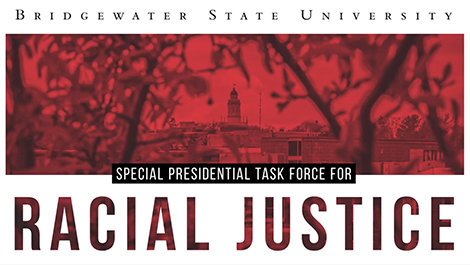
“Any change, any advancement, any positive outcome has to start from a certain sense of acknowledging the truth."
The leaders of Bridgewater State University’s new Special Presidential Task Force on Racial Justice bring decades of experience striving for equality. They say they are ready to guide the institution through what they expect will be a transformative process for all.
“It will take every member of our BSU community, no matter our race, ethnicity or identity, to make real change in eradicating the scourge of racism and the threat of implicit bias,” said President Frederick W. Clark Jr., '83.
Clark tapped Davede Alexander, and Drs. Carolyn Petrosino and Mary Grant to head a group that includes Bridgewater students, employees and alumni.
A ‘window’ for change
BSU Trustee Davede Alexander says he has prepared his whole life to tackle this work, and the widespread Black Lives Matter protests offer an opportunity for meaningful change. Many who may have once opposed such demonstrations have a new understanding, he said.
“In a very short period of time, those same people who would have had doubts now fully accept the truth of that movement, fully understand the basic tenets of it, and have joined in it in such a way that there is a window to advance forward,” he said.
A Navy veteran, Alexander founded the consulting firm Innovo Strategic Solutions and directed strategic outreach at the U.S. Naval Academy. Alexander brings decades of relevant experience to the task force. Any person of color, he said, can probably cite instances where they faced discrimination.
“Any change, any advancement, any positive outcome has to start from a certain sense of acknowledging the truth,” he said.
One must also reflect on the important role of minorities in the United States.
“I think history has a way of glossing over or robbing African Americans of the amazing amount of valor, sacrifice and overall determination to make this country better,” he said. “I think that it’s amazing that people can continue to improve a country that spent so much time rejecting them.”
A “responsibility” to join the conversation
Carolyn Petrosino, professor emerita of criminal justice, believes the country has arrived at an unprecedented moment, where those speaking out and protesting cross racial, economic and generational lines to a degree not witnessed before.
Bridgewater has “a responsibility to join this very important conversation about race, racial injustices, the legacy of slavery in this country and how its impact costs all of us today,” she said.
Petrosino taught at BSU for two decades and researches topics such as systemic inequality in the justice system and hate crimes. She also brings her “lived experience” as an African American to a task force that must understand what black and brown students face.
“Whatever pressures they are experiencing, we need to carefully listen and validate (their concerns),” she said. “If the problem is not acknowledged, solutions and real change will not occur.”
The task force and BSU, Petrosino said, must get it right.
“It’s a very important opportunity and I am so appreciative of Bridgewater stepping in to embrace it,” she said.
‘Imperative’ work
Mary Grant is BSU’s senior administrative fellow for civics and social justice. She traces her commitment to social and racial justice to her time as a student, which included the pursuit of a doctorate degree in social welfare policy at Brandeis University.
The persistent inequalities in society as well as the vociferous voices calling for change inspire her to keep tackling these challenges.
“We have to make sure we’re all engaged in this work,” she said. “We can’t turn away. There’s too much at stake. It’s imperative, it’s urgent and it’s overdue.”
She emphasized the need to listen and then take action within the university and the larger community.
Grant, who leads BSU’s Martin Richard Institute for Social Justice, previously served as president and CEO of the Edward M. Kennedy Institute for the U.S. Senate. She was also chancellor of the University of North Carolina in Asheville and president of the Massachusetts College of Liberal Arts.
“I think we have enormous significant issues of inequality and racism that we have to take on,” she said. “If higher education isn’t willing to do this work, I really worry about who will.”
Do you have a BSU story you'd like to share? Email stories@bridgew.edu.


